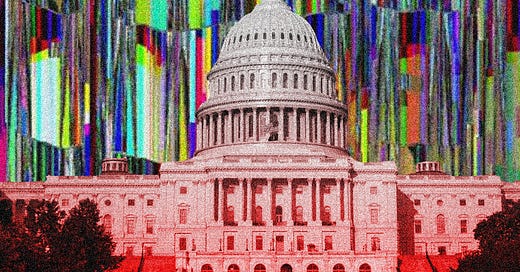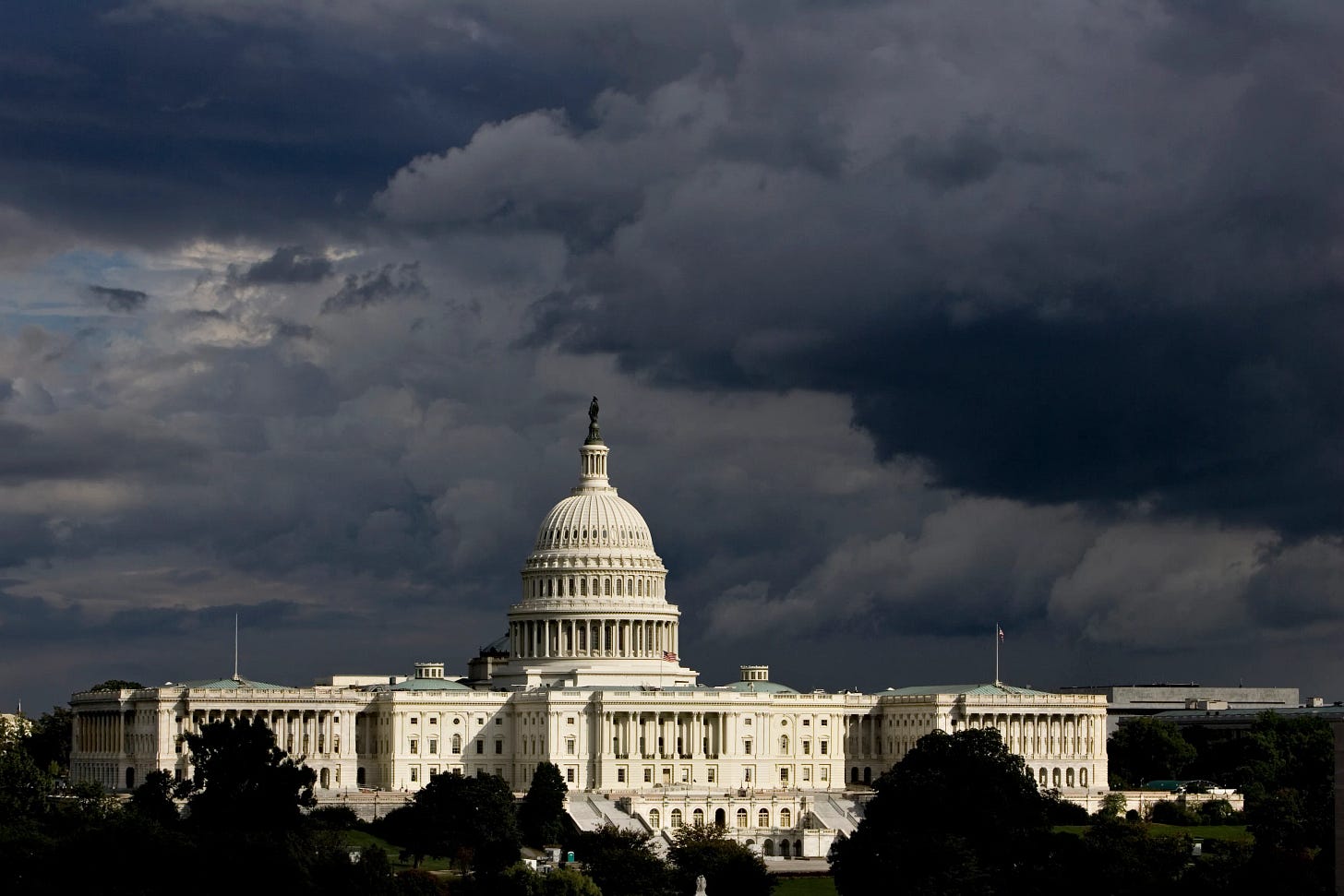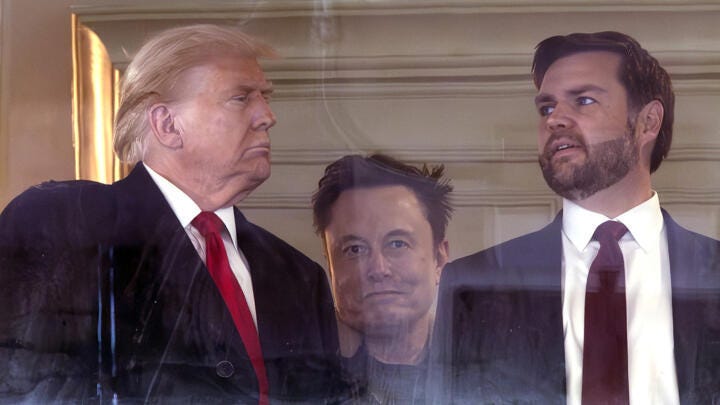This is part 3 in the ideology series, read part 4 here.
After transforming the presidency into a fully embodied executive with the creation of DOGE, an ideological war hound designated to crush dissenters and reward insider cronies, Trump has provided us an answer to the muddy question of who really controls federal agencies.
And with the announcement of so-called retaliatory tariffs, which are in no way proportional to the tariffs that are actually placed on the US, Trump has created the Executive Patronage Economy. On the executive panel sits Trump, Elon, and Vance. These billionaire oligarchs demand that businesses play ball to receive the tariff exemptions that they desperately need to survive. This means that America as we know it is an oligarchy.
But how did we get to the point where the executive has full tariff power? It’s this power that the patronage economy rests on.
In an article back in August 2024, where I argued against Trump, I cited tariff power as an example of an area where the executive has way more authority than they ought to have.
The Trade Expansion Act of 1962 (Section 232), the Trade Act of 1974 (Section 301), the International Emergency Economic Powers Act (IEEPA), and the Tariff Act of 1930 all contribute to the executive’s tariff authority. Both Trump and Biden invoked the Trade Expansion Act and the Trade Act of 1974 to levy tariffs, and Trump also threatened to use the IEEPA during negotiations with Mexico but didn’t have to because Mexico gave in anyway. There’s nothing really stopping Trump from instituting arbitrarily high tariffs, which will not only damage the United States but also our allies abroad as well.
For reference, the IEEPA is the statute the current administration is launching its tax war with.
This explains why Trump kept bringing up tariffs on the campaign trail. Normally presidents would champion congressional legislation or paint a picture of the future that involves the rest of the government. But in Trump’s case, tariffs became the primary policy lever they referenced. The reason for this is that tariffs represent the ability to exert maximum leverage over the economy. By bringing the business community to its knees, as well as plunging us into a recession, he gains more personal control over the country in the process—no doubt to funnel favors and funds to his friends, family, and close confidants.
This is all occurring in the background of his “I will run for a third term” comments which are frightening to anyone paying attention. The plan began with exerting full control over the executive by placing fellow dementor-oligarch Musk in charge of bringing agencies to heel. It proceeded forward with the massive overstep of leveraging huge tariffs on the economy. Comments about trade deficits are a red herring, as the ideological backing of these moves is not to place America into a better position, but to benefit him.
The phrase “short-term pain for long-term gain” is instructive here. The short term pain is on US citizens. The long-term gain is for Trump and his gang of yes-men. Cries of so-called “Trump Derangement Syndrome” and “The left kept crying wolf” play into this plan, allowing MAGA to metaphorically boil the frog, as plainly-evidenced arguments pointing towards exactly what MAGA is planning are deemed deranged and outrageous.
“Come on, they don’t want Trump to run for a third term”, they say, as we are currently slide towards oligarchy.
The system doesn’t work
In his summary of political professor Juan Linz’s work, Matthew Yglesias writes:
The late political scientist Juan Linz observed in his 1990 article “The Perils of Presidentialism” that the Madisonian or presidential style of democracy was associated with much more constitutional instability than the parliamentary form.
As he saw it, the interbranch conflict that Madison believed to be a guarantor of freedom was actually a source of brittleness. If the president wants X and the Congress wants Y then either they compromise or else nothing happens. That’s fine most of the time, but unlike in a parliamentary system where you can call a new election to resolve the conflict, or have a coalition “collapse” and be replaced with a new one, in a presidential system you’re just stuck. That can encourage various kinds of extra-constitutional measures to pressure one side or the other into surrendering, which in turn tends to generate a breakdown of the democratic process.
…
I agreed with Linz that while we had the ideologically scattered parties of the 20th century, the Madisonian system worked pretty well. For example, since many Democrats were conservatives and some Republicans were liberals, a Democratic Party member of Congress would sometimes act as a Democrat who wanted his party to win office, but he might also act as part of a trans-partisan ideological coalition. And he might also act as a steward of Congress, protecting it against a presidential power grab. The members were selfish about their own personal power rather than being team players. Presidents would come and go, but you wanted your committee to have power. But polarized, ideologically infused parties would be a different matter. We had that in the 1850s and it led to the Civil War. And now we have it again in the 21st century and it’s leading us to a bad place.
In so many words, a presidential system is a fine balance between the parties and government branches. This impacts our current political environment due to the following key factors:
The weakening of Congress and transfer of power to the executive → the most important part of this is tariffs, with various bills passed in the 20th century delegating this power away from Congress and towards the executive.
The consolidation of total party power → occurred on Jan 6th.
The consolidation of power away from independent agencies and into the executive → occurred with the implementation of DOGE.
Harming the real economy due to the actions of one man → ongoing.
The final step: ignoring Supreme Court or congressional orders to stand down → the beginning of a constitutional crisis. (Has not happened yet.)
What do we do from here?
The most important part of fixing a problem is acknowledging that it exists. Borrowing from political science, we must first cultivate what is called political consciousness. They say that knowing a demon’s name gives you power over it. In other words, political consciousness is simply the awareness that we are the metaphorical frog slowly boiling in the pot. A non-exhaustive list of next steps includes:
When people say that he didn’t say that he would run for a third term, provide evidence of him doing so. Do not back down from MAGA protestations that he didn’t say what he said.
Keep up the heat on Musk, which appears to be working. Musk is currently in control of the propaganda arm of MAGA, and losing him represents a blow to Trump’s ability to disseminate fake news favorable to the administration. The cracks are already showing.
Deal the Republican party blows in special elections when possible. Luckily this has already occurred. The biggest remaining opportunity here is the midterms.
Publicly express dissatisfaction with the Trump recession. The administration needs to be broadly liked, and they may not go through with their plans if they are confident that they will lose. They may even back off of tariffs if the public and market backlash is too intense.
If you work in the government, do not resign under any circumstances.
Remember, Trump voters are not the enemy. Very few voted for this. This struggle includes all of us.
TL;DR
An insider group of corrupt billionaires are gaining vast amounts of power over the country which is threatening the balance of power.
But I don’t think they will succeed.
To gain the power of One, you must be beloved by the Many. As Curtis Yarvin frequently points out, those that have gained vast amounts of power have approached the people with a promise: “I will do what must be done.” The people are the source of the would-be monarch’s power. Luckily, Trump, Musk, and Vance are widely hated because everyone knows that they are corrupt and evil.
Our nation has survived threats to its democracy before. Let’s keep it that way.
If you made it this far, thank you. Please consider subscribing and restacking this article. If you would like to read more, check out “My Journey From The Left To The Center-Left” or “A letter to open-minded right wingers.”







The only way for darkness to spread is in the absence of light. Thank you for acting as a beacon. We must stand up to those who would sacrifice our democracy for their own power.